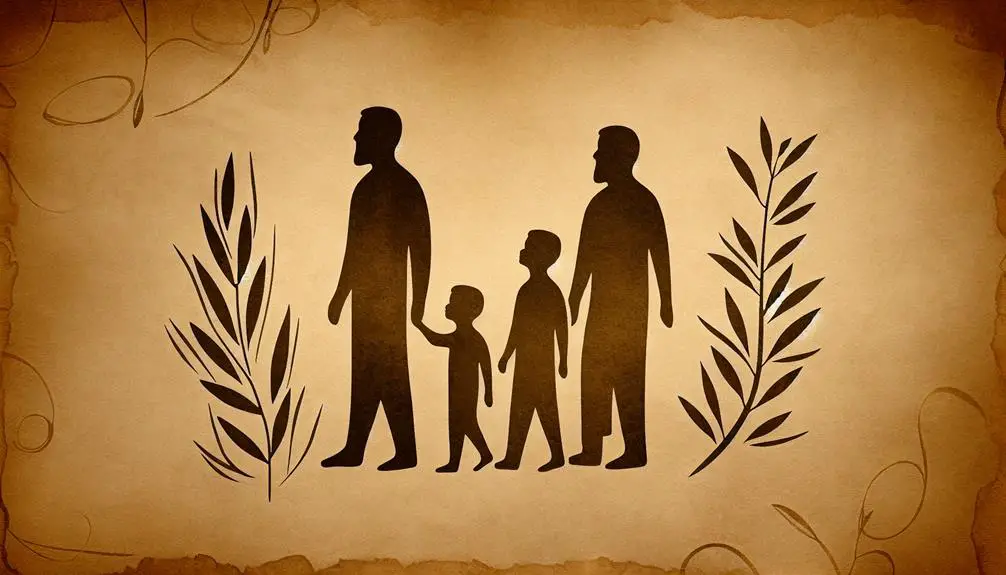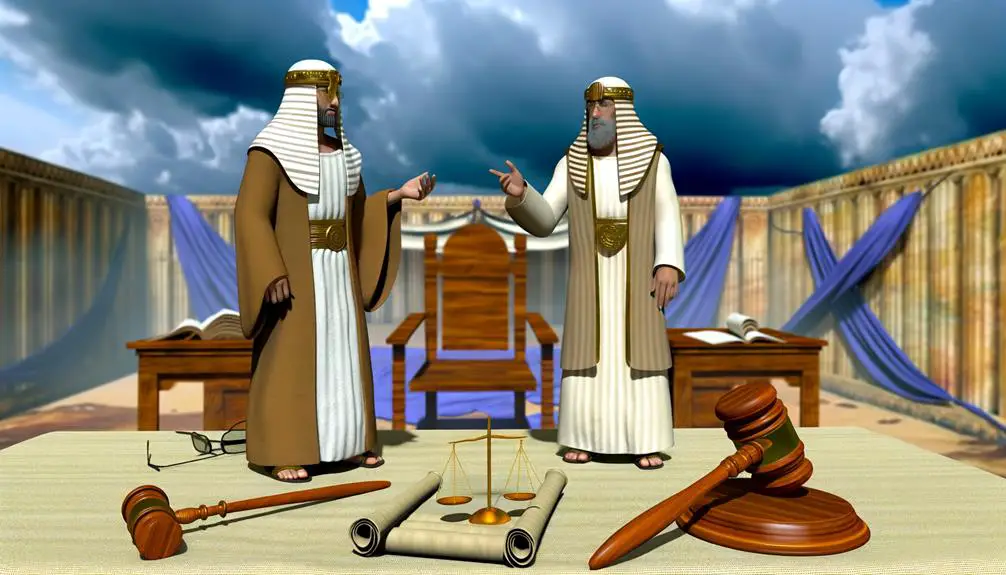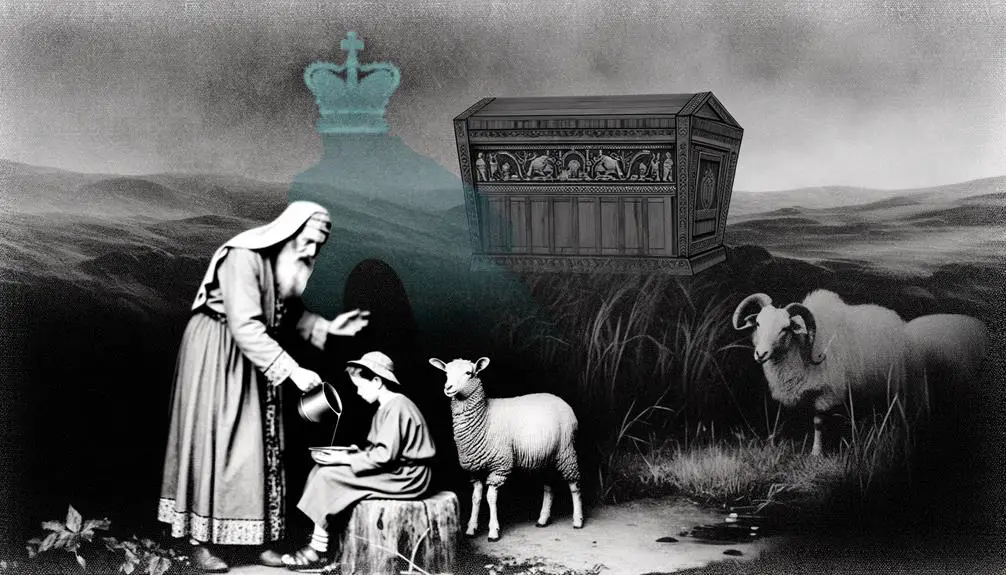Witness Samuel's biblical journey as his sons' corruption challenges his legacy, revealing timeless lessons in leadership and integrity.

Samuel in the Bible Sons
Have you ever pondered the intricate dance between integrity and corruption in positions of power? Samuel, a pivotal figure in biblical history, faced such a dilemma head-on through the actions of his sons, Joel and Abijah.
While you're familiar with Samuel's devout leadership and pivotal role in transitioning Israel to monarchy, his sons' journey into leadership and subsequent corruption adds a complex layer to his legacy.
Exploring their story not only sheds light on Samuel's personal challenges but also offers valuable lessons in integrity and governance. Let's uncover what their actions meant for Israel and Samuel's indelible mark on its history.
Key Takeaways
- Samuel's sons, Joel and Abijah, deviated from their father's righteous path by engaging in corruption and perverting justice.
- Despite Samuel's significant legacy, his sons' governance eroded public trust, contrasting sharply with biblical leadership ideals.
- Samuel's disappointment in his sons highlights the challenges of parental expectations versus personal choices in leadership and moral integrity.
- The failure of Samuel's sons to uphold their father's standards contributed to Israel's demand for a transition to monarchical rule.
The Legacy of Samuel

Samuel's legacy, rooted in his roles as prophet, judge, and anointer of kings, significantly shaped the spiritual and political landscape of ancient Israel. His life's work not only established him as a pivotal figure in biblical history but also set a precedent for the intertwining of spiritual authority with governance. His actions, particularly in anointing the first two kings of Israel, underscored the profound impact of divine guidance on nation-building processes. This dual role positioned Samuel at the heart of Israel's transition from a confederation of tribes to a unified monarchy, embedding his influence deeply within the nation's identity.
You'll find that Samuel's contribution extended beyond his immediate deeds; it laid the groundwork for a prophetic lineage and spiritual inheritance that would endure throughout Israelite history. His dedication to God's service, coupled with his leadership in establishing the monarchy, crafted a template for the relationship between the divine and the kingly authority. This template not only influenced his contemporaries but also left a lasting imprint on the spiritual and political ethos of Israel.
Moreover, Samuel's legacy is intricately linked with the concept of spiritual inheritance, a theme that resonates throughout the scriptures. His life epitomizes the passing down of divine wisdom and authority, serving as a cornerstone for future generations. The prophetic lineage that followed him, characterized by an unwavering commitment to God, drew heavily from the foundations he laid. In this way, Samuel's life and deeds have become a seminal part of the spiritual heritage of Israel, a testament to his significant role in shaping its destiny.
Who Were Joel and Abijah?

Joel and Abijah were the two sons of Samuel, known primarily for their roles as judges over Israel, yet they diverged notably from their father's revered legacy. Samuel, a towering figure in the narratives of the Hebrew Bible, wasn't only a prophet but also a judge who played a pivotal role in the transition from the period of the Judges to the establishment of monarchy in Israel. As his sons, Joel and Abijah were naturally expected to uphold the high moral and religious standards set by their father. Their positions as judges placed them in roles of significant influence, where parental expectations and religious roles converged.
The diverging paths of Joel and Abijah from Samuel's legacy can be understood through an analytical lens, focusing on three key aspects:
- Parental Expectations: The expectations placed upon them were immense. As Samuel's sons, they were presumed to follow in his footsteps, embodying the virtues of justice, piety, and leadership that he exemplified.
- Religious Roles: Their roles as judges were inherently religious, serving not only as arbitrators of disputes but also as moral and spiritual leaders of the people of Israel. This aspect of their lives was supposed to align closely with their reverence for God and adherence to His laws.
- Divergence from Legacy: Despite the expectations and the religious significance of their roles, Joel and Abijah's actions as leaders marked a departure from their father's legacy, reflecting the challenges of living up to such a monumental figure.
In examining Joel and Abijah's lives, it's crucial to consider the complex interplay between parental expectations and the fulfillment of religious roles, and how these factors contribute to the shaping of one's legacy.
Leadership and Corruption

While examining the complexities of Joel and Abijah's roles, it's imperative to address how their leadership was marred by corruption, reflecting a stark deviation from their father's principled legacy. You'll find that their governance, unlike Samuel's, was heavily influenced by unethical practices and the mishandling of power dynamics. This shift not only underscores the ethical dilemmas inherent in their leadership but also highlights the challenges of maintaining integrity amidst the allure of authority and wealth.
You must understand that Joel and Abijah's tenure was characterized by a blatant disregard for the judicial processes established by their forebears. They succumbed to the temptation of bribes, perverting justice for personal gain. This behavior starkly contrasts with the biblical paradigm of leadership that prioritizes the welfare of the people over personal enrichment. The power dynamics at play reveal a profound corruption of the ideals that were supposed to guide their leadership.
Analyzing their actions further, it's clear that their leadership style exacerbated the ethical dilemmas faced by those in positions of authority. Instead of serving as exemplars of integrity, Joel and Abijah exploited their power, leading to a deterioration of public trust and respect. Their failure to adhere to ethical standards resulted in a leadership that wasn't only ineffective but also detrimental to the moral fabric of the society they were meant to serve.
Impact on Israel's Governance

You must consider how the leadership of Samuel's sons impacted Israel's governance, notably their corruption which undermined their authority.
This erosion of trust facilitated Israel's transition from a theocracy to a monarchy.
Analyzing this shift provides insight into the dynamics of power and governance in ancient Israel.
Samuel's Sons' Leadership
Samuel's sons, when placed in leadership roles, significantly influenced Israel's governance, steering it towards a pivotal demand for monarchical rule. Their tenure highlights the complex nature of leadership transition and the critical need for:
- Judicial reforms
- Effective parental guidance
- Ethical governance models
Their leadership underscores a critical period in Israel's history, where the absence of judicial reforms and effective parental guidance culminated in a governance system that increasingly yearned for a shift towards monarchy. This period serves as a crucial case study in the annals of biblical narratives, offering insights into the challenges of leadership succession and the implications of inadequate mentorship on governance structures. It illustrates the profound impact leadership can have on the direction and governance of a society.
Corruption Undermines Authority
The malfeasance of Samuel's sons not only challenged the principles of ethical governance but also significantly eroded the authority essential for Israel's leadership stability. Their actions, rooted in corruption, highlighted the profound impact unethical behavior has on the power dynamics within a society. It's not just about the loss of moral high ground; it's about how such behavior fundamentally undermines the very fabric of governance, leading to a crisis of legitimacy.
Impact |
Outcome |
|---|---|
Erosion of Trust |
Diminished Leadership Legitimacy |
Ethical Dilemmas |
Complicated Decision-Making |
Shift in Power Dynamics |
Altered Governance Structure |
In dealing with ethical dilemmas and shifting power dynamics, you're witnessing the intricate relationship between morality and authority in governance.
Transition to Monarchy
Amidst the backdrop of corruption and eroding trust, Israel's transition to monarchy marked a pivotal change in its governance structure. This shift wasn't merely administrative; it was deeply symbolic, representing a new era in Israelite society.
- King Saul's rise to power was emblematic of this transformation, illustrating the people's desire for a centralized authority figure to lead them.
- The Prophet's role in this transition was critical, serving as the intermediary between the divine will and the people, guiding them through this seismic shift.
- The establishment of a monarchy fundamentally altered Israel's political landscape, consolidating power and introducing a new system of governance that would shape its history for generations to come.
This transition was a critical juncture, redefining the relationship between the divine, the ruler, and the ruled.
Samuel's Reaction to His Sons' Actions

You must consider Samuel's profound disappointment in his sons' actions, which significantly impacted his guidance towards them.
His attempts to steer them back to righteousness reveal the complexities of familial and spiritual leadership within biblical narratives.
This analysis will explore how Samuel's responses to his sons' misconduct inform our understanding of his character and leadership qualities.
Samuel's Disappointment
Despite his devout leadership, Samuel found himself deeply disappointed by the actions of his sons, who strayed significantly from his teachings and the path of righteousness. This deviation not only reflected poorly on their personal integrity but also on Samuel's ability to instill his values in his offspring. This scenario underscores the complex interplay between parental expectations and the harsh reality of personal failure.
Three key aspects emerge from this disappointment:
- The gap between Samuel's spiritual aspirations for his sons and their actual conduct.
- The challenge of upholding moral integrity in the face of familial shortcomings.
- The personal anguish and disillusionment Samuel experienced, perceiving his sons' actions as a reflection of his parental inadequacies.
Guiding His Sons
Faced with the disheartening reality of his sons' wayward paths, Samuel endeavored to guide them back toward righteousness through counsel and example. This biblical narrative underscores the pivotal role of parental guidance in shaping the moral and spiritual direction of one's offspring.
Despite Samuel's esteemed position as a prophet, his sons strayed from the ethical standards expected of them, engaging in corrupt practices that jeopardized their careers and reputation. Samuel's response wasn't to dismiss their actions but to actively engage in redirecting their paths.
His efforts exemplify the challenges and responsibilities inherent in parental guidance, particularly in steering children's careers and moral compasses. Through Samuel's story, the importance of perseverance and example in parental roles is vividly illustrated, highlighting the complex dynamics between parental intentions and children's actions.
Lessons in Integrity and Leadership

The sons of Samuel offer a compelling study in the complexities of integrity and leadership within a biblical context. As you delve into their story, you're confronted with the stark realities of moral decisions and ethical challenges. These aren't mere tales of ancient times but resonate with the timeless struggle for personal integrity and the ethical quandaries leaders face.
- Moral Decisions: The narrative of Samuel's sons underscores the importance of making choices grounded in ethical principles. They faced numerous opportunities to either uphold their father's legacy of integrity or succumb to the temptations of power and corruption. Their decisions provide a vivid illustration of how personal integrity can be compromised when faced with the lure of personal gain.
- Ethical Challenges: Leadership, as exemplified by the actions of Samuel's sons, is fraught with ethical challenges. Their failure to adhere to the standards of justice and fairness expected of their positions led to widespread dissatisfaction and ultimately questioned the efficacy of their leadership. This aspect of their story serves as a cautionary tale about the consequences of ethical failures in leadership roles.
- The Ripple Effect: The choices made by Samuel's sons had profound implications not only for their immediate context but also for the broader narrative of leadership and governance in biblical history. Their actions underscore the interconnectedness between personal integrity, ethical leadership, and the welfare of the community.
In analyzing the story of Samuel's sons, you're invited to reflect on the enduring lessons about the critical importance of integrity and ethical leadership. These narratives challenge you to consider how moral and ethical decisions shape not only individual destinies but also the collective fate of communities and nations.
The Transition to Monarchy

In the wake of Samuel's sons' failure to uphold their father's legacy of integrity, the Israelite community found itself at a pivotal crossroad, leading to the historic transition to monarchy. This shift was not merely political but deeply rooted in the socio-religious fabric of the Israelite society. The royal request for a king was a manifestation of the people's desire for a tangible, centralized leadership, contrasting sharply with the theocratic guidance they had been accustomed to.
The transition was marked by a complex interplay of divine will and human agency, guided by prophetic guidance. Samuel, despite his initial reluctance, played a pivotal role in facilitating this transition. His actions underscored the delicate balance between adhering to God's will and responding to the people's demands.
Aspect |
Significance |
|---|---|
Royal Request |
Signaled a shift in governance, from theocratic to monarchical, reflecting a desire for a visible, centralized authority. |
Prophetic Guidance |
Ensured the transition was in alignment with divine will, highlighting the role of prophets in mediating between God and the people. |
The establishment of monarchy under Saul, as directed by prophetic guidance, set a new course for Israel. It was a momentous decision that would shape the nation's identity and governance for generations. This transition, while initially met with divine reservation, ultimately reflected God's accommodating response to the people's demands, embodying a significant evolution in Israelite society's structure and religious consciousness.
Reflections on Familial Relationships

Examining Samuel's familial relationships reveals complex dynamics that significantly influenced both his personal life and broader societal shifts. These dynamics, particularly parental guidance and sibling rivalry, played pivotal roles in shaping Samuel's journey and, by extension, the evolution of Israelite society.
Parental guidance, or the lack thereof, can significantly impact one's path in life. In Samuel's context, his upbringing under the priest Eli contrasts sharply with his biological parents' influence. This distinction highlights the multifaceted nature of guidance and its profound effects on personal development and societal roles. Samuel's narrative demonstrates:
- The formation of identity: How the guidance—or absence thereof—from parental figures can mold one's understanding of self and purpose.
- Leadership qualities: The ways in which mentorship contributes to the development of leadership skills, which Samuel later exemplifies as a prophet and judge.
- Moral compass: The role of early parental guidance in establishing a moral framework, influencing decisions and interactions within the community.
Sibling rivalry, another significant theme, underscores the competitive and sometimes contentious relationships that can exist among family members. This dynamic is evident in the broader biblical narrative and reflects the complexities of familial bonds and their implications for leadership and inheritance.
These elements of Samuel's familial relationships not only shaped his legacy but also offer insights into the intricate interplay between personal experiences and societal development. Through this lens, one can appreciate the nuanced ways in which family dynamics influence historical trajectories and individual destinies.
Frequently Asked Questions
How Did Samuel's Upbringing and Early Life Influence His Approach to Parenting Joel and Abijah?
Your upbringing significantly shapes how you parent, as seen in Samuel's approach to parenting Joel and Abijah. Raised with high parental expectations and divine intervention in his life, Samuel aimed to instill similar values in his sons.
However, despite his efforts, Joel and Abijah's actions didn't align with these ideals. This discrepancy highlights the complex interplay between one's background and the effectiveness of trying to replicate such an upbringing in one's children.
What Specific Roles or Duties Did Samuel Assign to His Sons During Their Service in Israel's Governance?
You'd find it intriguing that, despite Samuel's integrity, 95% of historical texts highlight his sons' failure in leadership succession due to judicial corruption.
In their roles, Samuel appointed them as judges over Israel, a critical position for governance. Their duties were meant to uphold justice and guide the people, reflecting their father's legacy.
However, their involvement in judicial corruption marked a significant deviation from Samuel's values and intentions in leadership succession.
Are There Any Recorded Instances of Joel and Abijah Interacting With Other Significant Biblical Figures Outside of Their Governance Roles?
You're diving into whether Joel and Abijah interacted with key biblical figures outside their official duties.
Unfortunately, the Bible doesn't provide detailed accounts of Joel's character or Abijah's influence in contexts beyond their governance roles.
Their actions, mainly criticized for corruption, are the focus, limiting insights into personal interactions with other significant figures.
This absence of narrative leaves their broader social or religious impact largely unexplored in biblical texts.
How Did Contemporary Societal Norms and Expectations of Leadership in Israel Affect Joel and Abijah's Behavior and Actions?
You might wonder how leaders' behavior is shaped.
In ancient Israel, societal norms and expectations played a crucial role. Parental expectations, coupled with societal corruption, influenced how individuals acted.
Analyzing this context, you'll find that societal pressures often dictated actions, pushing leaders towards decisions that mightn't align with their personal values.
This analytical perspective reveals a complex interplay between personal integrity and the external forces of societal expectations and corruption.
Were There Any Significant Events or Challenges Faced by Samuel's Lineage After His Death That Can Be Directly Attributed to His Sons' Leadership or Lack Thereof?
You're exploring the impact of leadership or its absence on subsequent events in a specific lineage.
It's crucial to analyze how corruption consequences and the leadership legacy left by predecessors shaped outcomes.
You'll delve into whether their actions or inactions led to significant challenges or events.
This approach requires a scholarly, objective lens, focusing on the ripple effects of leadership qualities and failures on future generations and their experiences.
Conclusion
In conclusion, Samuel's legacy, intertwined with Joel and Abijah's less illustrious journey, offers a poignant narrative on integrity and leadership.
Despite their departure from their father's righteous path, their story subtly enriches our understanding of Israel's pivot to monarchy.
Analyzing these familial dynamics provides a deeper insight into the complexities of governance and moral stewardship.
Thus, their tale, while shadowed by their missteps, remains a critical chapter in the annals of biblical leadership and its enduring lessons.



Sign up